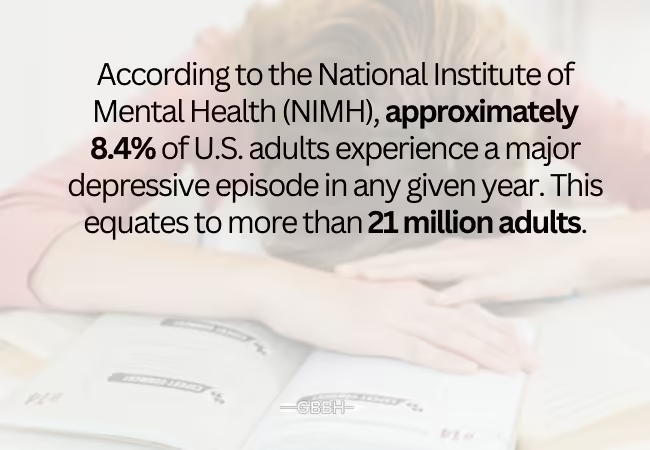It’s normal to feel sad, frustrated, or “down” occasionally in response to life’s challenges. However, when these feelings linger and start interfering with your ability to function, it may signal something more serious—depression. Understanding the difference between a temporary low mood (feeling blue) and clinical depression is essential for knowing when to seek professional help.
At Greater Boston Behavioral Health, we offer mental health treatment programs designed to help individuals struggling with depression. Whether through Cognitive Behavioral Therapy, Dialectical Behavioral Therapy or an Intensive Outpatient Program, we provide the support you need to reclaim your mental health and well-being.
The Key Differences Between Feeling Blue and Depression
Feeling blue is a temporary emotional state that usually arises in response to specific events or situations, such as stress at work, relationship struggles, or a bad day. These feelings tend to pass after a short period, and you can usually return to your normal activities.
However, depression is not just a temporary feeling. It is a serious medical condition that affects how you think, feel, and function on a daily basis. Depression involves persistent sadness, hopelessness, and a loss of interest in activities that were once enjoyable. Unlike feeling blue, depression doesn’t go away easily and often requires professional intervention to help manage and overcome.
Here’s a breakdown of the key differences:
- Duration: While feeling blue can last a few hours or a few days, depression lasts for weeks or even months without treatment. It often significantly impacts your ability to carry out everyday tasks.
- Intensity: Depression is marked by profound emotional and physical exhaustion. Unlike the temporary sadness experienced with the blues, depression often includes symptoms like persistent fatigue, feelings of worthlessness, and a sense of hopelessness that can make even simple tasks feel overwhelming.
- Impact on Functioning: Depression severely interferes with your ability to work, engage socially, or perform daily routines. In contrast, feeling blue doesn’t usually impact your ability to function in these areas.
Symptoms of Depression
Depression can manifest in different ways, and recognizing the symptoms is an important step toward seeking the right treatment. Some of the common signs of depression include:
- Constant sadness or a feeling of emptiness
- Loss of interest in activities that were previously enjoyable (anhedonia)
- Changes in appetite or weight (eating too much or too little)
- Sleep disturbances (insomnia or oversleeping)
- Fatigue or feeling physically drained, even after rest
- Difficulty concentrating or making decisions
- Feelings of guilt or worthlessness
- Thoughts of death or suicide (in severe cases)
If you recognize any of these symptoms in yourself or a loved one, it’s important to seek help. Early intervention can make a significant difference in the recovery process.
The Impact of Depression on Daily Life
Depression goes beyond occasional feelings of sadness or low mood; it has a profound impact on many areas of life. Those suffering from depression often find it difficult to carry out everyday tasks, whether it’s going to work or school, managing household responsibilities, or maintaining personal hygiene. Depression can lead to chronic fatigue, making it hard to stay motivated or focused on activities that once brought joy. Social interactions may feel overwhelming or unnecessary, leading to withdrawal from loved ones and isolation.
Physically, depression can manifest in symptoms such as changes in appetite (eating too much or too little), disturbed sleep patterns, and aches and pains that have no apparent physical cause. The emotional and physical toll depression takes can diminish quality of life and leave individuals feeling helpless and hopeless, making it crucial to seek treatment to regain balance.
Risk Factors for Depression
Depression can affect anyone, but there are certain risk factors that make individuals more susceptible. Some of these factors include:
- Genetics: A family history of depression or other mental health disorders can increase the likelihood of developing depression. Studies have shown that depression can be hereditary, although the exact genes involved are still being researched.
- Chemical Imbalances: Neurotransmitters like serotonin and dopamine, which regulate mood and emotions, play a role in depression. Imbalances in these chemicals can contribute to the development of depression.
- Trauma and Stress: Childhood trauma, such as abuse or the death of a loved one, can have lasting emotional effects. Similarly, ongoing stressors like financial troubles, relationship problems, or job stress can increase the risk of depression.
- Chronic Illnesses: Those who suffer from chronic health conditions such as heart disease, diabetes, or chronic pain may be more vulnerable to depression due to the ongoing stress and physical limitations these conditions impose.
- Personality Factors: Individuals who are more pessimistic, have low self-esteem, or tend to ruminate on negative thoughts are at a higher risk for depression.
Signs You Should Seek Professional Help
Depression may appear as a temporary feeling of sadness, but if left untreated, it can worsen and interfere significantly with daily functioning. Knowing when to seek professional help is key to preventing a downward spiral. Some signs that you should seek professional help include:
- Persistent sadness: When feelings of sadness, emptiness, or hopelessness linger for weeks or months without relief.
- Loss of interest: A lack of interest or pleasure in activities that you once enjoyed, including hobbies, work, and socializing.
- Changes in appetite or sleep: Significant weight loss or gain, or changes in sleep patterns (insomnia or sleeping too much) that affect your energy levels.
- Difficulty concentrating: Trouble focusing, remembering things, or making decisions.
- Thoughts of self-harm: Having thoughts of suicide or self-harm is a serious warning sign that requires immediate professional intervention.

When to Seek Help for Depression
Many people experience temporary sadness or a sense of being overwhelmed by life’s challenges, but if these feelings don’t go away and begin to disrupt your daily life, it may be time to seek professional help. For clinical depression, the following signs indicate that it’s time to reach out to a Mental Health Treatment Center in Massachusetts:
- You feel unable to shake off feelings of sadness or hopelessness.
- Your symptoms last for more than two weeks.
- You’re struggling to perform daily tasks, such as going to work, attending school, or engaging in social activities.
- You have thoughts of self-harm or suicide.
At GBBH, we provide a range of depression treatment program. Our therapies, including CBT and DBT, are designed to help individuals overcome the negative thought patterns that contribute to depression. We understand how difficult it can be to reach out for help, and we are here to guide you through the process of healing.
The Role of Family and Friends in Supporting a Loved One with Depression
Supporting a loved one with depression can be challenging, but your involvement can play a critical role in their recovery. Here are several ways families and friends can offer support:
- Listen Without Judgment: Often, people with depression may feel misunderstood or isolated. Providing a non-judgmental, empathetic ear can help them feel heard and validated.
- Encourage Professional Help: Encourage your loved one to seek help from a mental health professional, and offer to assist with finding a treatment center or attending appointments. Treatments such as Cognitive-Behavioral Therapy (CBT) and Dialectical Behavior Therapy (DBT) have been proven effective for depression.
- Help with Daily Tasks: Depression can make everyday tasks overwhelming. Offer to help with activities like grocery shopping, cooking, or cleaning to lighten their load.
- Be Patient: Recovery from depression can take time. Be patient with your loved one as they work through their challenges. Offer consistent support, even when they don’t seem receptive.
- Take Care of Yourself: Supporting someone with depression can be emotionally taxing, so it’s important to prioritize your own mental health. Seek support for yourself if needed to avoid burnout.
Treatment Options for Depression
When depression affects your life, it’s important to seek appropriate treatment to restore your emotional well-being. Here are some common treatment options available at GBBH:
- Psychotherapy (Talk Therapy):
- Cognitive Behavioral Therapy (CBT) is one of the most effective therapeutic approaches for depression. CBT helps individuals identify and change negative thought patterns that contribute to feelings of sadness and hopelessness. By restructuring these patterns, CBT empowers patients to reframe their emotions and behaviors, improving their mental health.
- Dialectical Behavioral Therapy (DBT) is another effective therapy, especially for individuals who struggle with emotional regulation. DBT combines cognitive-behavioral techniques with mindfulness practices to help individuals manage their emotions and cope with stress.
- Medication:
- For some people, antidepressants can be a key part of depression treatment. Antidepressant medications can help balance the brain chemicals that affect mood and emotional regulation. Medication is often used in combination with therapy for optimal results.
- Lifestyle Modifications:
- Maintaining a healthy lifestyle is crucial for mental health. Regular physical activity, a balanced diet, and adequate sleep can help improve mood and overall well-being.
- Intensive Outpatient Programs (IOP):
- For individuals who require more support but don’t need inpatient care, IOP provides intensive, structured treatment that allows patients to return home each night. It’s an ideal option for people who need a more robust treatment approach but still want to live at home and maintain their daily routines.
How Greater Boston Behavioral Health Can Help
If you or a loved one is struggling with depression, it’s important to reach out to a mental health treatment center in Massachusetts that offers comprehensive and compassionate care. Greater Boston Behavioral Health is here to help. Our team of professionals is dedicated to providing personalized care to address the unique needs of each patient. We offer evidence-based therapies such as Cognitive Behavioral Therapy and Dialectical Behavioral Therapy, as well as a variety of mental health treatment programs for those dealing with depression and other conditions.
Our depression treatment program includes access to outpatient mental health treatment, IOP, and a variety of support services designed to guide individuals through the recovery process. With our expertise and support, you can begin the journey to healing.
Conclusion
While feeling sad occasionally is a normal part of life, depression is a serious condition that requires attention and treatment. Understanding the difference between feeling blue and experiencing clinical depression is the first step in getting the help you need. If you’re struggling with symptoms of depression, contact Greater Boston Behavioral Health today. We offer a range of mental health therapy programs, including Cognitive Behavioral Therapy and Dialectical Behavioral Therapy, to help you overcome depression and regain control of your life. Take the first step today and reach out to us at (888)278-0716 and invest in your mental wellness you deserve it.
FAQs on Feeling Blue vs. Being Depressed
What is the difference between feeling blue and depression?
Feeling blue is a temporary emotional state often caused by stress or a specific event. Depression, on the other hand, is a persistent condition that affects your mood, energy, and daily life for an extended period, typically more than two weeks.
What should I do if I suspect I’m depressed?
If you experience symptoms like persistent sadness, loss of interest, or difficulty functioning in daily life, it’s important to seek professional help. Depression is treatable with therapy, medication, and lifestyle changes.
What is the best therapy for treating depression?
Cognitive Behavioral Therapy (CBT) is one of the most effective therapies for treating depression. It helps individuals identify and challenge negative thought patterns that contribute to their depression. Dialectical Behavioral Therapy (DBT) is also highly effective, especially for those who need support with emotional regulation.
Can medication help with depression?
Yes, antidepressant medications can help regulate mood by balancing brain chemicals. Medication is often used in combination with therapy for the best outcomes.

